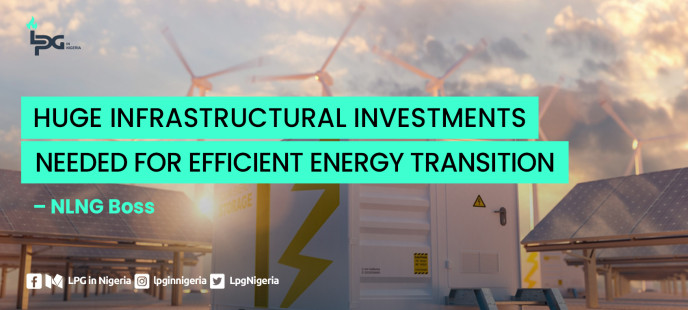- 3229
- 0
Sharing Ideas and Updates on LPG in Nigeria and related information to enable effective collaboration within the LPG Value Chain
Huge Infrastructural Investments Needed For Efficient Energy Transition – NLNG Boss

Developing nations, including Nigeria, require significant infrastructural investments to achieve an efficient and equitable energy transition, according to Dr. Philip Mshelbila, Managing Director and CEO of Nigeria LNG (NLNG). Speaking at a global leadership panel on energy inclusion in Houston, Texas, Mshelbila emphasized the need for investment to expand access to natural gas and Liquefied Natural Gas (LNG) as part of the shift toward a lower-carbon energy system.
He highlighted the challenges facing developing economies, particularly in ensuring that natural gas and LNG can play a major role in this transition. Mshelbila stressed that energy inclusion is critical, warning that excluding large segments of the population from access to clean energy could hinder progress toward climate goals.
Using Nigeria as an example, Mshelbila pointed out that the country’s population is projected to grow from around 200 million today to 250 million by 2050. Most of this population growth will come from young people with increasing energy needs. “It’s essential to have a diverse energy mix to support this growing population,” he said, highlighting natural gas as a key transition fuel for Nigeria's energy future.
He noted that Nigeria has made strides in this direction with the government’s "Decade of Gas" initiative launched in 2020. NLNG is a major player in this effort, currently supplying nearly 40% of the country’s LPG demand, amounting to over 400,000 metric tonnes. By focusing on domestic LPG production, Nigeria is also reducing reliance on charcoal and wood burning, which contribute to pollution and premature deaths.
Mshelbila further emphasized that energy is essential for industrialization in developing nations, with natural gas playing a crucial role. He called on global energy policymakers to prioritize energy equity and inclusion to ensure that the energy needs of ordinary people, particularly women, are met. He urged producing nations to maximize their natural gas resources for national development.
Other stakeholders at the panel echoed Mshelbila’s sentiments, underscoring the importance of infrastructure development for pipelines, LNG terminals, and storage facilities. Public-Private Partnerships (PPPs), green financing mechanisms, and strong regulatory frameworks were also highlighted as key components to ensure a fair and effective energy transition in developing nations.
Of course I have to give my opinion on the subject, Dr. Philip Mshelbila’s call for significant infrastructural investments to drive Nigeria's energy transition is both timely and essential. As the country’s population grows and energy demands rise, the focus on expanding access to natural gas and Liquefied Natural Gas (LNG) as transition fuels is critical for ensuring a sustainable energy future. Without massive investments in infrastructure, many Nigerians, particularly women and marginalized communities, may remain excluded from the benefits of clean energy, which could hinder the country’s climate goals. The government's Decade of Gas initiative is a step in the right direction, but to truly maximize natural gas for industrialization and development, stronger global partnerships, green financing, and effective regulatory frameworks must be in place. Ensuring energy equity will not only support Nigeria’s growth but also provide a model for other developing nations striving for an inclusive and lower-carbon energy future.
Source: The Tribune.
















0 Comment.